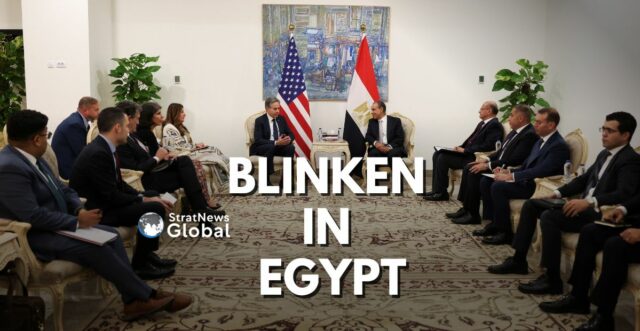U.S. Secretary of State Antony Blinken flew to Egypt on Tuesday, pushing for areas of possible progress on a Gaza ceasefire and hostage release deal in talks planned for later this week, with major areas of dispute left unresolved.
Blinken arrived in Egypt from Tel Aviv, where he announced that Israeli Prime Minister Benjamin Netanyahu had agreed to a U.S. “bridging proposal” aimed at narrowing the gaps between the two sides after talks last week paused without a breakthrough. Blinken also called on Hamas to accept the proposal as a foundation for further negotiations.
The Palestinian militant group has not definitively rejected the proposal, but has said it backtracks from areas previously agreed and has accused Israel and its U.S. ally of spinning out the negotiations process in bad faith.
In Egypt, Blinken was meeting President Abdel-Fattah El-Sisi, whose country has been helping mediate the on-off Gaza talks for months along with the U.S. and Qatar.
At stake is the fate of tiny, crowded Gaza, where Israel’s military campaign has killed more than 40,000 people since October according to Palestinian health authorities, and of the remaining hostages being held there.
The Continued Crisis
The war in Gaza began on Oct. 7, 2023, when Hamas gunmen stormed into Israeli communities, killing around 1,200 people and abducting about 250 hostages, according to Israeli tallies.
On Tuesday, Israel’s military said it had recovered the bodies of six hostages from southern Gaza, adding that 109 hostages remained in the Palestinian territory, of whom Israel around a third are believed already to be dead.
In Gaza, Israeli forces battled Hamas-led militants in central and southern areas, and Palestinian health authorities said at least 12 people had been killed early on Tuesday in Israeli strikes, including on a school housing displaced people.
Israel’s military said it had struck militants in a Hamas centre embedded in the school.
Gaza’s Hamas-run health ministry said on Tuesday it was still waiting for polio vaccines to arrive after the disease was discovered in the territory, where most people now live in tents or shelters without proper sanitation. It echoed a call by the U.N. last week for a ceasefire to allow the vaccination campaign.
Conflicting Views
Blinken has called the latest push for a deal “probably the best, possibly the last opportunity”, and said his meeting with Netanyahu was constructive, adding it was incumbent on Hamas to accept the bridging proposal.
U.S. officials have not spelled out what is in the proposal or how it differs from previous versions. “There are questions of implementation and making sure that it’s clearly understood what each side will do to carry out its commitments,” Blinken said on Monday.
Senior Hamas official Osama Hamdan criticized the latest developments, claiming that the U.S. bridging proposal accepted by Netanyahu introduced ambiguities because it differed from previous agreements with the group. Months of intermittent negotiations have revolved around the same issues, with Israel insisting that the conflict will only end with the dismantling of Hamas as a military and political entity, while Hamas demands a permanent ceasefire rather than a temporary one.
There are disagreements over Israel’s continued military presence inside Gaza, particularly along the border with Egypt, the free movement of Palestinians inside the territory, and the identity and number of prisoners to be freed in a swap.
Egypt is particularly focused on a security mechanism for the Philadelphi Corridor, the narrow border strip between Egypt and Gaza that Israeli forces seized in May. Both Hamas and Egypt oppose the presence of Israeli troops in the area, but Netanyahu argues that their presence is necessary to prevent weapons smuggling into Gaza.
According to Egyptian security sources, the U.S. has suggested an international presence in the corridor, which Cairo might find acceptable if it is limited to a maximum of six months. Additionally, the Egyptian President has also warned of the risk of the Gaza war expanding regionally in a way “difficult to imagine”.
(With inputs from Reuters)
















